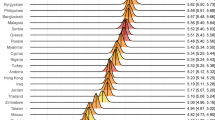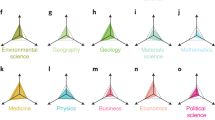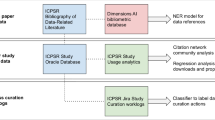Abstract
Passionate disagreements about climate change, stem cell research and evolution raise concerns that science has become a new battlefield in the culture wars. We used data derived from millions of online co-purchases as a behavioural indicator for whether shared interest in science bridges political differences or selective attention reinforces existing divisions. Findings reveal partisan preferences both within and across scientific disciplines. Across fields, customers for liberal or ‘blue’ political books prefer basic science (for example, physics, astronomy and zoology), whereas conservative or ‘red’ customers prefer applied and commercial science (for example, criminology, medicine and geophysics). Within disciplines, ‘red’ books tend to be co-purchased with a narrower subset of science books on the periphery of the discipline. We conclude that the political left and right share an interest in science in general, but not science in particular. This underscores the need for research into remedies that can attenuate selective exposure to ‘convenient truth’, renew the capacity for science to inform political debate and temper partisan passions.
This is a preview of subscription content, access via your institution
Access options
Access Nature and 54 other Nature Portfolio journals
Get Nature+, our best-value online-access subscription
$29.99 / 30 days
cancel any time
Subscribe to this journal
Receive 12 digital issues and online access to articles
$119.00 per year
only $9.92 per issue
Buy this article
- Purchase on Springer Link
- Instant access to full article PDF
Prices may be subject to local taxes which are calculated during checkout




Similar content being viewed by others
References
Daston, L. & Galison, P. Objectivity (Zone Books, 2007).
Habermas, J. The Structural Transformation of the Public Sphere: An Inquiry into a Category of Bourgeois Society (MIT Press, 1991).
Shapin, S. A Social History of Truth: Civility and Science in Seventeenth-Century England (Univ. Chicago Press, 1994).
Shapiro, B. J. A Culture of Fact: England, 1550–1720 (Cornell Univ. Press, 2003).
Sutton, G. V. Science for a Polite Society: Gender, Culture, and the Demonstration Of Enlightenment (Westview, 1997).
Kohut, A., Keeter, S., Doherty, C., Dimock, M. & Leshner, A. I. A Survey Conducted in Collaboration with the American Association for the Advancement of Science (Pew Research Center for the People & the Press, AAAS, 2009).
Funk, C. et al. Public and Scientists’ Views on Science and Society (Pew Research Center for the People & the Press, AAAS, 2015).
Public Praises Science; Scientists Fault Public, Media (Pew Research Center for the People & the Press, AAAS, 2009).
Fiorina, M. P. & Abrams, S. J. Political polarization in the American public. Annu. Rev. Polit. Sci. 11, 563–588 (2008).
Farrell, J. Corporate funding and ideological polarization about climate change. Proc. Natl Acad. Sci. USA 113, 92–97 (2015).
Suhay, E. & Druckman, J. N. The politics of science political values and the production, communication, and reception of scientific knowledge. Ann. Am. Acad. Pol. Soc. Sci. 658, 6–15 (2015).
Oreskes, N. & Conway, E. M. Merchants of Doubt: How a Handful of Scientists Obscured the Truth on Issues from Tobacco Smoke to Global Warming (Bloomsbury USA, 2011).
Jasanoff, S. Technologies of humility. Nature 450, 33 (2007).
Bolsen, T. & Druckman, J. N. Counteracting the politicization of science. J. Commun. 65, 745–769 (2015).
Berezow, A. B & Campbell, H. Science Left Behind: Feel-Good Fallacies and the Rise of the Anti-Scientific Left (PublicAffairs, 2012).
Gauchat, G. Politicization of science in the public sphere: a study of public trust in the United States, 1974 to 2010. Am. Sociol. Rev. 77, 167–187 (2012).
Bishop, B. The Big Sort: Why the Clustering of Like-Minded America is Tearing Us Apart (Mariner, 2009).
Bakshy, E., Messing, S. & Adamic, L. Exposure to ideologically diverse news and opinion on Facebook. Science 384, 1130–1132 (2015).
DellaPosta, D., Shi, Y. & Macy, M. Why do liberals drink lattes? Am. J. Sociol. 120, 1473–1511 (2015).
Yeo, S. K., Xenos, M. A., Brossard, D. & Scheufele, D. A. Selecting our own science: how communication contexts and individual traits shape information seeking. Ann. Am. Acad. Pol. Soc. Sci. 658, 172–191 (2015).
Jelveh, Z., Kogut, B. & Naidu, S. Political language in economics. Preprint at http://dx.doi.org/10.2139/ssrn.2535453 (2014)
Massey, D. S. & Tourangeau, R. Where do we go from here? Nonresponse and social measurement. Ann. Am. Acad. Pol. Soc. Sci. 645, 222–236 (2013).
Vanraan, A. F. J. Fractal dimension of co-citations. Nature 347, 626–626 (1990).
Jenssen, T.-K., Lægreid, A., Komorowski, J. & Hovig, E. A literature network of human genes for high-throughput analysis of gene expression. Nat. Genet. 28, 21–28 (2001).
Chen, C. Searching for intellectual turning points: progressive knowledge domain visualization. Proc. Natl Acad. Sci. USA 101, 5303–5310 (2004).
Uzzi, B., Mukherjee, S., Stringer, M. & Jones, B. Atypical combinations and scientific impact. Science 342, 468–472 (2013).
Sinatra, R., Deville, P., Szell, M., Wang, D. & Barabási, A.-L. A century of physics. Nat. Phys. 11, 791–796 (2015).
Eakin, E. Study finds a nation of polarized readers. The New York Times (13 March 2004).
Krebs, V. The Social Life of Books: Visualizing Communities of Interest via Purchase Patterns on the WWW. (OrgNet, 1999); http://www.orgnet.com/booknet.html
Krebs, V. Divided We Stand? (OrgNet, 2003); http://www.orgnet.com/leftright.html
Linden, G., Smith, B. & York, J. Amazon.com recommendations: item-to-item collaborative filtering. IEEE Internet Comput. 7, 76–80 (2003).
Molloy, M. & Reed, B. A critical point for random graphs with a given degree sequence. Random Struct. Algorithms 6, 161–180 (1995).
Sunstein, C. R. Republic.com 2.0 (Princeton Univ. Press, 2009).
Pariser, E. The Filter Bubble: How the New Personalized Web Is Changing What We Read and How We Think (Penguin, 2011).
Kahan, D. M. Ideology, motivated reasoning, and cognitive reflection: an experimental study. Judgm. Decis. Mak. 8, 407–24 (2012).
Jacques, P. J., Dunlap, R. E. & Freeman, M. The organisation of denial: conservative think tanks and environmental scepticism. Environ. Polit. 17, 349–385 (2008).
Lupia, A. Communicating science in politicized environments. Proc. Natl Acad. Sci. USA 110, 14048–14054 (2013).
Dietz, T. Bringing values and deliberation to science communication. Proc. Natl Acad. Sci. USA 110, 14081–14087 (2013).
Maibach, E. W. & van der Linden, S. L. The importance of assessing and communicating scientific consensus. Environ. Res. Lett. 11, 091003 (2016).
Alinsky, S. Rules for Radicals (Knopf Doubleday, 2010).
Sabidussi, G. The centrality index of a graph. Psychometrika 31, 581–603 (1966).
Acknowledgements
We are grateful for comments from participants in seminars at Microsoft Research–New England, MSR-NY, GESIS-Koln, University of Michigan School of Information, Duke University DNAC, the first International Conference on Computational Social Science, and the Computational Social Science Summit at Northwestern. We acknowledge funding from the John Templeton Foundation to the Metaknowledge Network, NSF SES 1303533, SES 1226483, SES 1158803, National Research Foundation of Korea NRF-2013S1A3A2055285 and Air Force Office of Scientific Research FA9550-15-1-0162, and computation support from the Open Science Data Cloud. The funders had no role in study design, data collection and analysis, decision to publish or preparation of the manuscript.
Author information
Authors and Affiliations
Contributions
All authors designed the research and drafted the paper. F.S., Y.S. and F.A.D. gathered and analysed the data.
Corresponding authors
Ethics declarations
Competing interests
The authors declare no competing interests.
Supplementary information
Supplementary Information
Supplementary Figures, Supplementary Notes, Supplementary Tables 1 and 2. (PDF 1046 kb)
Supplementary Information
(TXT 111 kb)
Supplementary Information
(TXT 138 kb)
Supplementary Information
(XLSX 124 kb)
Supplementary Information
(XLSX 33 kb)
Rights and permissions
About this article
Cite this article
Shi, F., Shi, Y., Dokshin, F. et al. Millions of online book co-purchases reveal partisan differences in the consumption of science. Nat Hum Behav 1, 0079 (2017). https://doi.org/10.1038/s41562-017-0079
Received:
Accepted:
Published:
DOI: https://doi.org/10.1038/s41562-017-0079
This article is cited by
-
Partisan styles of self-presentation in U.S. Twitter bios
Scientific Reports (2024)
-
Algorithmic thinking in the public interest: navigating technical, legal, and ethical hurdles to web scraping in the social sciences
Quality & Quantity (2022)
-
Quantifying social organization and political polarization in online platforms
Nature (2021)
-
Discrepancy in scientific authority and media visibility of climate change scientists and contrarians
Nature Communications (2019)
-
The wisdom of polarized crowds
Nature Human Behaviour (2019)



